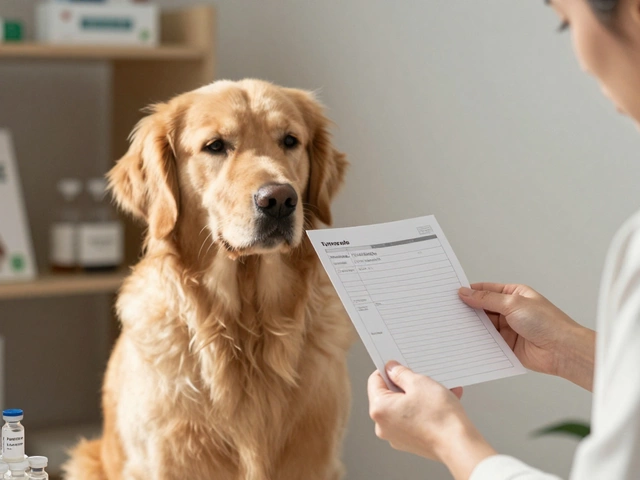Ever wondered if your dog needs a vitamin boost? You're not alone. As pet owners, we all want the best for our furry friends, and ensuring they're getting the right nutrients is a big part of that. So, let's figure out how to tell if your dog might need some vitamin TLC.
First off, understanding what vitamins do is a good starting point. Vitamins are essential for your dog's overall health, playing key roles in things like immune function, energy levels, and even the quality of their fur. But too much or too little can be a problem. It's all about balance.
Look out for signs like sluggishness, poor coat condition, or unusual eating habits. These could hint that something's off in the nutrition department. And don't forget, lifestyle matters too. Active dogs may have different needs than couch potatoes.
- Getting to Know Dog Vitamins
- Signs Your Dog Might Need Vitamins
- Consulting Your Vet
- Balancing Diet and Supplements
- Choosing the Right Products
Getting to Know Dog Vitamins
When it comes to making sure your dog stays fit and healthy, understanding dog vitamins is a key part of the puzzle. Vitamins are actually vital to many bodily functions for dogs, just like they are for us. They help with everything from maintaining a healthy coat to making sure their immune system is in tip-top shape.
Essential Vitamins for Dogs
Let's break it down. Dogs typically need a range of vitamins for optimal health. Here are the ones you should know about:
- Vitamin A: This is crucial for your dog's vision, skin health, and immune function. It's like the building block of healthy growth.
- Vitamin D: Often dubbed the sun vitamin, this one helps keep your dog's bones strong by aiding calcium absorption.
- Vitamin E: This acts as an antioxidant and is important for cell function and fat metabolism.
- Vitamin K: Essential for blood clotting, and dogs sometimes get this from leafy greens or supplements.
- Vitamin B Complex: There are several different B vitamins, each playing a role in energy production and maintaining brain health.
Natural Sources vs. Supplements
Your dog's food is the best place to start when ensuring they're getting all the right vitamins. Most commercial dog foods are formulated to be nutritionally complete, but there are times when supplements might be necessary. For instance, if your pup has specific health concerns or you're preparing homemade meals, you might need to supplement.
One neat fact, did you know about half of pet owners in the US give their dogs some form of dietary supplement? This includes vitamins, showing just how common it is to go beyond what the food bowl offers.
Quick Tips to Keep in Mind
- Always consult with your vet before starting any new supplement regimen. They can provide tailored advice based on your dog's health and lifestyle.
- Look for pet health supplements that specify they're for dogs—human vitamins can be harmful to our canine friends.
- Pay attention to dosage. More isn't always better, and overdosing can lead to other health issues.
Signs Your Dog Might Need Vitamins
Knowing the signs that your dog might need some vitamin support is crucial. Just like humans, dogs can show symptoms when they're lacking essential nutrients.
Energy Levels and Activity
One of the first things to watch for is low energy. If your usually bouncy pup seems more like a lazy cat lately, it might be a sign they're lacking vital nutrients. Canine nutrition affects their overall energy levels and vitality. They could be missing key vitamins like B-complex or iron, which help with energy production.
Coat and Skin Condition
A dog's coat can tell you a lot about their health. Dull, brittle fur or flaky skin might indicate a deficiency. Omega-3 fatty acids, often in supplements, are important for keeping that doggie coat glossy and skin healthy.
Digestive Issues
Digestive problems like diarrhea, constipation, or frequent vomiting aren't just unpleasant; they might hint at a deficiency in dietary nutrients. Fiber, often overlooked, plays an important role in gut health.
Weight Changes
Sudden weight gain or loss can be alarming. If your pup is packing on pounds or dropping them without a change in diet or exercise, it might be time to look at their dog vitamins intake. This could reveal imbalances in their diet.
Behavioral Changes
Dogs may also exhibit behavioral shifts when not getting enough vitamins. Increased anxiety, aggression, or lethargy can crop up when their nutritional needs aren't met.
A Detailed Look at Deficiency Symptoms
| Vitamin | Possible Symptom |
|---|---|
| A | Night blindness, dull coat |
| D | Weak bones, joint issues |
| E | Muscle weakness, poor reproduction |
| K | Clotting disorders |
| B-complex | Fatigue, poor growth |
Remember, these signs might indicate other health issues too, so consulting a vet is always a smart move. It's essential to confirm whether supplements are the right course of action for your dog’s specific needs.

Consulting Your Vet
Before jumping into the world of dog supplements, it's super important to have a chat with your vet. They know your pet's health history and can offer guidance on whether your pooch actually needs extra dog vitamins.
Your vet might run a few tests to check for any deficiencies or health issues. Dogs that have specific health conditions may require specialized nutrients, which only a professional can identify.
What Questions to Ask?
Here’s a quick list of questions that can help you gather insightful info during your visit:
- Does my dog need any specific canine nutrition supplements?
- How can I tell if my dog has a vitamin deficiency?
- Are there any risks in supplementing their diet?
- Can you recommend a brand or product?
Vets are your go-to when it comes to distinguishing between essential and non-essential supplements. While some dogs might thrive on a balanced diet, others may need an extra boost, especially if they're picky eaters or have restrictions.
Routine Check-ups
Regular check-ups are a great way to track your dog's health and nutritional needs. Not all dog supplements are necessary for every pooch, and some might even cause more harm than good if used incorrectly. Keeping an eye on changes over time with a vet's help can really make a difference in your pet's health trajectory.
Remember, while the internet offers tons of advice, nothing beats professional vet advice tailored specifically to your furry friend.
Choosing the Right Products
Picking the right dog vitamins isn't as simple as grabbing the first bottle you see on the shelf. It's kind of like choosing a multivitamin for yourself, but with a little more wagging involved. To start, always look for products that are specifically formulated for dogs. Human vitamins are not a good substitute since they might contain harmful ingredients for your pet.
Check the Quality
Quality matters when it comes to pet health supplements. Look for brands that follow higher manufacturing standards. One way to do this is by checking for labels that mention third-party testing or certifications by organizations like the National Animal Supplement Council (NASC). These imply that the product meets certain safety and quality standards.
"A supplement is only as good as its ingredients, so transparency from the company about where ingredients are sourced from is crucial," says Dr. Jane Doe, a leading pet nutritionist.
Know What Vitamins Your Dog Needs
The vitamins your dog needs can depend on their age, size, and specific health needs. For example, larger breeds may need extra support for joint health, whereas puppies might benefit from omega-3 fatty acids for brain development. Make sure you're matching the supplement to the dog—it's not one-size-fits-all!
A Balanced Approach
Always consider the balance between diet and supplements. If your dog's food is already fortified with vitamins, additional supplements might be redundant, or worse, lead to overdoses. Consulting with a vet helps ensure you're not doubling up unnecessarily. Dr. John Smith, a veterinarian, suggests, "Think of supplements as exactly that: a supplement. They should fill in the gaps, not replace whole elements of your dog's diet."
Read the Label Carefully
Yep, it's like those times you scan through cereal boxes at the store, looking at sugar content. Keep an eye on the active and inactive ingredients. Sometimes, less is more—simple formulations are often better absorbed and tolerated.
A quick tip? Avoid products with excessive artificial additives or fillers. They could potentially irritate your dog's digestion or trigger allergies.
Trial and Error
Sometimes, finding the right product involves a bit of trial and error. Keep tabs on your dog’s reaction to new supplements and note any positive or negative changes. And remember, patience is key. It can take a few weeks to notice visible benefits.





